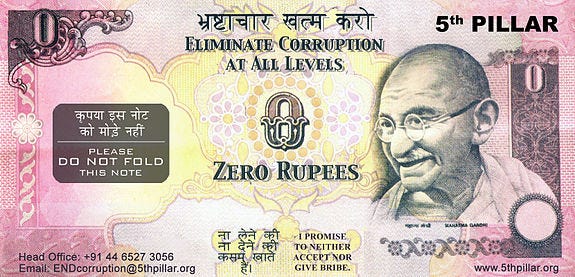Hello, again dear friends! I was happy to receive so many good reviews and interesting comments last week. One in particular stands out. Mr. Pidatala Padmanabha, a nonagenarian, served as a bureaucrat in various capacities including as an officer in the PMO’s office during Mrs. Indira Gandhi’s time and subsequently as BWSSB Chairman. He is a voracious reader and my newsletter does not escape his studious bent of mind. At his age, I'm not sure if I could hold a book straight, forget reading it. I intend to interview him on his days as a bureaucrat and a diplomat. He wrote to me thus, after reading FC #22:
Corruption is as old as the hills.
Samuel Bishop, an 18th-century poet and academic, sarcastically adapted the nursery rhyme Little Jack Horner to describe the bureaucracy in England:
“What are they but Jack Horners
Who snug in their corners
Cut freely the public pie?
Till each with thumb has squeezed
Out a round plum
Then he cries "What a good man am I"
Mr. Padmanabha also drew my attention to an article in the Economist dated 30th January 2010 titled “A Zero Contribution” — an unconventional way to combat petty corruption. Vijay Anand, who runs an NGO called 5th pillar, got ‘zero notes’ printed with the legend “Eliminate Corruption At All Levels”, and gave them to the expectant staff who were so taken aback holding the Zero note with Bapu smiling that they ended up doing their duty without demanding any bribe.
It is not known if this Zero approach is still on. Nevertheless a novel way of combating the menace of corruption at the ground level.
🤝 Do You Wanna Partner O Partner?
You may have heard this song in the movie Partner (2007), but I am just using it here as a tagline to discuss some of the good, bad and ugly aspects of partnership at a commercial, business or professional level. So, if you feel the need to team up with someone first you ask yourself “do I want a partner?”, “why do I need a partner” and “who do I want as a partner?”
It’s good to know the difference between ‘entering into a partnership’ and ‘partnering with someone’. Entering into a partnership would mean creating a contractual relationship that requires serious introspection and due diligence. Partnering on the other hand means teaming up with one or more parties while you execute a project by deploying your capabilities and competencies. A simple example of ‘partnering with’ can be the coming together of an architect and a builder of a house. Both have contracts with the owner of the land but they are not contractually bound with each other. In other words, neither of them is an agent or a contractor of the other but work together on a principal to principal basis.
Entering into a partnership can be a very risky proposition if it is founded on exigency and dependency. A hurried approach is fraught with pitfalls, and over-dependence on a partner will most likely put you at a disadvantage over time. As a lawyer, I have come across a number of instances where one partner has breached the trust of the other and has left them scarred both emotionally and financially. I have heard clients lamenting and regretting getting into a partnership. And in one case, I was shocked to hear one of the clients say that there was no formal documentation and that the partnership was based on trust!
The problem lies in the blind belief that nothing will go wrong and there’s no need to engage in hard negotiation before inking the deal among partners. It serves well to remember what John F Kennedy said: “Let us never negotiate out of fear. But let us never fear to negotiate”. It augurs well to negotiate frankly and openly.
There’s a famous saying “don’t mix business with pleasure”. Here the word pleasure could mean both animate and inanimate aspects. If you invent a reason to go to Jaipur on business when in fact your intention is to attend a wedding, that is unethical and may question your own integrity. That’s the inanimate aspect of pleasure. Any number of such examples can be given.
The more important meaning of ‘pleasure’ in the animate sense is ‘real people’ who could be friends, relatives or strangers.
Experience has shown that doing business with friends and relatives is fraught with emotion, tension, apprehension and compunction and any other ‘shun’ you can think of. Ha! That leads one to believe that it is better to shun doing business with friends and relatives unless one has the gumption to manage that hybrid relationship.
Business is inherently transactional in nature. Transactions can conclude cordially if there is clarity of thought and expression. Otherwise, things go awry and bitterness permeates that relationship. If the business is one of enduring nature designed to operate over a foreseeably long period, it has to be structured well, documented precisely and have all contingencies provided for in the contract. This is where the Kennedy principle ‘never fear to negotiate’ plays out.
I have always advised my clients that they can and should fight over matters of business as much as they need to before signing the document. Once signed, they should not have the need to look at that document but focus on doing business and nurturing the relationship that was contractually created. Follow the contract in letter and spirit — or better still, respect the spirit and don’t live to regret the letter.
There are laws that govern partnerships. The Indian Partnership Act 1932 and The Limited Liability Partnership Act. In a future newsletter, I shall write more about these two enactments.
But for now, I shall stay with the theme that deals with entering into partnership.
A partnership is not created by status. For example, a father, his two daughters and his two sons are running a family business. They do not become partners in a legal sense. This extends to an outsider who agrees to put in money to expand the family business in return for a share in the profits. That doesn't make the outsider a partner in a legal sense. He could at best be said to be partnering with the family. That is the kind of distinction that separates a person who is a partner from a person who partners with another. In order to create a partnership in the eyes of law, it has to be in the form of a contract.
There are two important aspects of getting into a partnership with a friend or a relative. Foremost is your ability to enforce ‘arm's length dealing’ as the first principle of business. The second, and the more challenging one, is to preempt collateral damage. Relationships can be ruined or strained and it may spill over to the drawing-room or the bedroom depending on the people contributing to the discord. Brothers can become strangers and glare daggers at each other, even if they don’t throw them.
There have been well-run partnerships, but those are relationship-driven and not driven by the dictum of law or contract. Some partnerships have hit turbulence when there has been a generational shift. Millennials have their own mind, vision, ideas and plans on how a business should be scaled up and they often succeed. But riding roughshod over the previous generation that ran the business hitherto can spell doom if caution is thrown to winds.
One should be cognizant of what is said in Chapter III Verse 01 of the Bhagavad Gita:
“Wisdom is superior to action”. The sage wisdom that Gen-Past possesses should not be ignored by Gen-Next. The actions of Gen-Next founded on the wisdom of Gen-Past are most likely to pay rich dividends.
Partnership like any other relationship should be founded on mutual trust and integrity. Suspicion is the antithesis of trust. While trust is fragrant and yet not appreciated, suspicion smells — it is easily picked up on and can erode trust from within.
Let me end this by quoting the Mahatma:
“I believe in trusting. Trust begets trust. Suspicion is fetid and only stinks. He who trusts has never yet lost in the world.”
Mahatma would be surprised and agonised if he were alive today to see how many people who chose to trust have indeed lost.
I invite my readers to reflect on what I have said in this newsletter and share their own experiences and perspectives.
See you next week, and as always, trust the mask and trust social distancing! Adieu!







On trust, one thing I learnt in my corporate career is to 'Trust - but Verify'.. My natural instinct to trust without verifying has got me into a lot of uncomfortable situations.. :)
Great to hear about the nonagenarian bureaucrat Pidatala Padmanabha. All I can say is that people of his ilk are fast dwindling and that they don’t make people like them anymore. Or the few who start off as Mr Clean soon get corrupted by the system - often drawn into the system, not willingly but simply because they find no way out. I sincerely hope that Vijay Anand’s NGO effort is not just a drop on the ocean, especially when we see that the few efforts in these direction are mired in red tape and court cases dissuading any attempts to make the change. “Be the Change” may look good in print but the system ensures it’s difficult to practice.
While reading your piece on Partnership, I couldn’t but help think of the one partnership- marriages- most of us get into without any formal documentation relying only on societal or family pressure to see us through. While it may have worked in the past, it clearly does not now. I am not advocating pre-nuptial agreements. It does not prevent the split, perhaps it may result in a split as the partners could be under the assurance that they have themselves covered for the eventuality. The high number of divorce cases we see now a days makes many to think “do I want a partner?” and “who do I want as a partner?”
Let’s get back into business partnership. The problem, as you say, lies in the blind belief that nothing will go wrong. It would pay to remember Murphy’s law “If anything can go wrong, it will”. As a Banker, I have seen many cases where Partnerships have floundered despite many reasons why it shouldn’t have. Many such businessmen have come before us reeling of the problems that their partner is causing them and their business. Most had a contract too between themselves but that has not prevented a rout in the arrangement. The split between the Ambani brothers indicate the type of problems that arrangements can face even when they are blessed with richness beyond one’s wildest dreams. And if, as you say, generation shift is added as a cause, cases of business arrangements hitting turbulence in due course is dime a dozen.